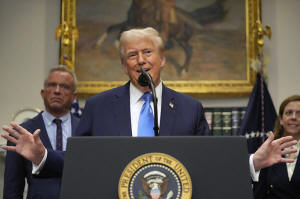Trump's misleading comments on autism validate the 'MAHA' movement and
reveal its political potency
[September 24, 2025]
By ALI SWENSON and JILL COLVIN
NEW YORK (AP) — As medical professionals react with alarm to President
Donald Trump's unproven statements about Tylenol, childhood vaccines and
autism, a different group of Americans is feeling vindicated.
For the ‘Make America Healthy Again’ movement, a diverse coalition that
includes supporters of health secretary Robert F. Kennedy Jr.,
anti-vaccine activists and others who distrust the American health care
system, Trump's Monday announcement was a watershed moment.
“I think that for the ‘MAHA’ movement, this is like the dark clouds have
finally parted and a single ray of sunshine is shining down,” Del
Bigtree, Kennedy’s former communications director and founder of the
advocacy group Informed Consent Action Network, said in an interview
Tuesday.
By amplifying the movement's long-held concerns about vaccines and
pharmaceutical products, Trump handed a major victory to a group that
has been growing in influence since he tapped Kennedy to oversee the
nation's health services. It's a coalition that is viewed as a
potentially important voting bloc for Republicans, but had become
impatient with what they saw as inaction by his administration.
Yet Trump's platforming of inaccurate health claims on the White House
stage also concerns medical professionals, including some Republican
lawmakers. After the announcement Monday, they urged people to listen to
their doctors and warned that following Trump's guidance for pregnant
women to entirely avoid Tylenol and for parents to delay vaccinations
could lead to other harmful health outcomes.

Vaccine skeptics see hope in Trump highlighting their claims
In Monday's news conference, Trump claimed that pregnant women using
acetaminophen, the painkiller known by the brand name Tylenol (or
paracetamol outside the U.S.), has contributed to the rise in autism
cases in the U.S. in recent years. While some studies have suggested a
potential correlation between the two, many others haven't found that
concern.
Experts say the research is inconclusive and the increase is mainly due
to better diagnoses and a new definition for the disorder that now
includes mild cases on a spectrum. In addition, the Coalition of Autism
Scientists said Monday that acetaminophen use during pregnancy hadn’t
increased in recent decades like autism rates have.
The president urged pregnant women to “fight like hell” to avoid taking
the most commonly used drug in the country. His advice also went beyond
the more nuanced Food and Drug Administration guidance released Monday,
which notes that the potential correlation is an area of ongoing debate
and that acetaminophen is the only over-the-counter drug approved for
treating fever during pregnancy.
Untreated fevers in pregnancy, particularly the first trimester,
increase the risk for miscarriages, preterm birth and other problems,
according to the Society for Maternal-Fetal Medicine.
Trump's comments also advanced a narrative discredited by decades of
evidence that the ingredients in vaccines or taking immunizations close
together can cause autism in children. Those claims appeal to ‘MAHA’
figures, including Kennedy, who have long insisted that vaccines and
autism are related.
“I think for many of us it was like: It’s about time,” John Gilmore,
executive director of the Autism Action Network, said in an interview.
“And it just felt extremely validating that the criticisms we’ve been
making of the vaccine program and health care are finally being taken
seriously.”

Kennedy's core supporters in the anti-vaccine movement were quick to
revel in the moment on social media and on podcasts, relieved the
announcement did not shy away from vaccines as some had anticipated it
would.
“We should all just be incredibly grateful,” MAHA Action president Tony
Lyons said on Steve Bannon’s show Monday, adding that Trump should be
known as the “MAHA” president.
Trump and Kennedy validate ‘MAHA moms’
The president and his health secretary directly addressed the parents of
children with autism, saying their trepidation about vaccines had not
been affirmed enough from the national stage.
“I want to reassure the people in the autism community that we will be
uncompromising and relentless in our search for answers,” Kennedy said.
The news conference also featured comments from two mothers who
expressed appreciation. One said she had been “crying out for help, for
answers, for years.”
[to top of second column]
|

President Donald Trump speaks in the Roosevelt Room of the White
House, Monday, Sept. 22, 2025, in Washington. (AP Photo/Mark
Schiefelbein)
 Josephine Lukito, a journalism and
media professor at the University of Texas at Austin, said appealing
to maternal concerns about children's health can be “incredibly
persuasive” and is a common strategy in the anti-vaccine movement.
She said Trump's comments also leaned on other rhetorical strategies
that are often used to spread vaccine misinformation, including
focusing on emotional anecdotes instead of specific data.
At one point in the news conference, Trump told a story about a
woman who used to work with him in Trump Tower and claimed her young
son got a high fever after receiving a vaccine. The president then
added he knew at least two other people who were “badly hurt” by
vaccinations, but did not go into detail.
“These sort of anecdotes are very, very salient among anti-vaxxers
because they tug at our heartstrings,” Lukito said in an interview.
“But one story does not a statistic make.”
The vast majority of parents in the U.S. are keeping their children
up-to-date with recommended childhood vaccines, but the Centers for
Disease Control and Prevention says rates have been falling for the
past five years. Nationwide, the percentage of kindergartners
receiving the most common childhood vaccines dropped well below 95%,
the level needed to protect the community against an outbreak.
During the news conference, Trump said he was a “believer” in
vaccines, but a different message came through for some of those
watching who have long been skeptics.
“I think what happened today is going to make parents think, Well,
wait a minute, I don’t even think I want to vaccinate now,” Polly
Tommey, director of the streaming arm of the anti-vaccine group
Children’s Health Defense, said in a video posted on X. “Because if
you read between the lines of what Trump was saying, vaccines are
unsafe, ineffective, can and do kill and cause autism.”
Some Republicans denounce Trump's guidance
Trump’s comments were praised by many of his allies in Congress.
Rep. Diana Harshbarger of Tennessee, vice chair of a House
subcommittee on health, wrote on X that Trump and Kennedy’s move
represented “real action” on autism and a turnaround from
previously, when “autism rates climbed while Washington stayed
silent.”

But the announcement created uneasiness among other prominent
Republicans and doctors, including Sen. Bill Cassidy of Louisiana, a
gastroenterologist who has pressed Kennedy on vaccines.
“HHS should release the new data that it has to support this claim,”
Cassidy wrote on X in response to Trump’s advice to women not to
take Tylenol during pregnancy. “The preponderance of evidence shows
that this is not the case. The concern is that women will be left
with no options to manage pain in pregnancy. We must be
compassionate to this problem.”
In Tennessee, Republican state Sen. Richard Briggs, a cardiothoracic
surgeon, cautioned people to check with their physicians about
acetaminophen and vaccinations. In a phone interview, the Knoxville
lawmaker also expressed concern about the administration firing some
internationally recognized scientists in the field.
North Dakota Republican state Sen. Judy Lee, who worked 10 years
doing chemical analyses in hospital clinics and labs, said in an
interview that she is “extremely disappointed that the president has
chosen to make such a firm statement about something that has no
scientific basis.”
“For the president to make that kind of pronouncement with no
personal expertise, no scientific background, no support of the
experts, which he has either gotten rid of or discounted at the CDC,
concerns me a great deal,” Lee said.
___
Associated Press writers Jack Dura in Bismarck, North Dakota, Meg
Kinnard in Columbia, South Carolina, Jonathan Mattise in Nashville,
Tennessee, Linley Sanders in Washington and Devi Shastri in
Milwaukee contributed to this report.
All contents © copyright 2025 Associated Press. All rights reserved
 |